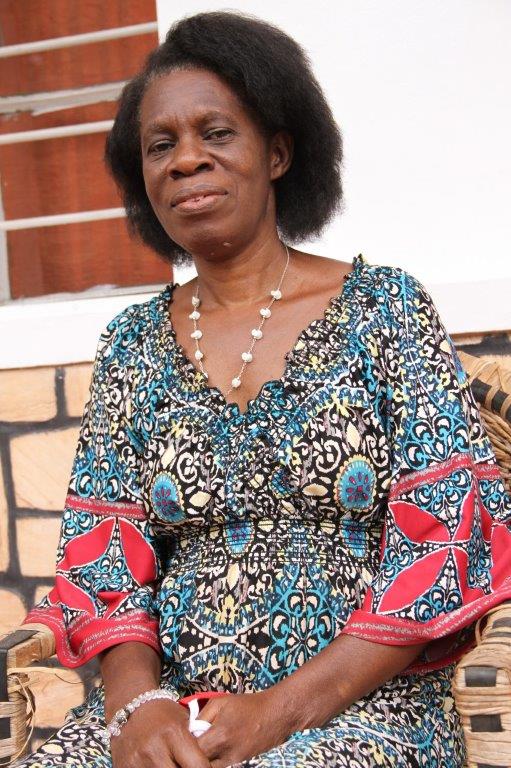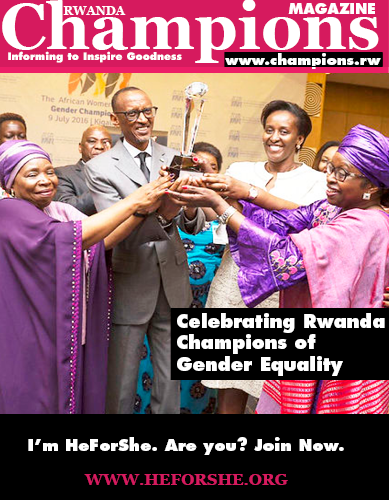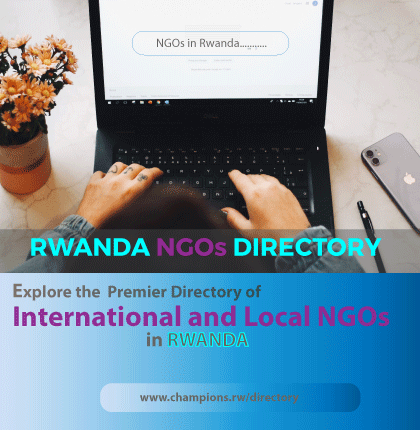UN Women Rwanda launches $6.3 million plan to boost women’s empowerment
UN Women Rwanda has launched a new four-year strategic plan that will require about $6.3 million to expand programs (…)
The Solidarity for the Blooming of the Widows and the Orphans aiming at Work and Self-Promotion(SEVOTA) is a Rwandan Non-Governmental Organization(NGO) which has spent over twenty years implementing different activities including those that empower women socially and economically. To understand its contribution in social and economic empowerment of women, Rwanda Champions Magazine spoke with its Founder GODELIEVE MUKASARASI as part of the celebration of the International Women’s Day 2021. Read the Experts Below.
When was SEVOTA founded and what were its goals?
SEVOTA was founded on December 28, 1994 after the Genocide Against the Tutsis. This was done in partnership with 27 Women to restore human relationships that had been destroyed. The official launch of the organization was held on March 8, 1995 during the peace campaign organized by Profemmes Twese Hamwe in Taba. SEVOTA has the general objective of promoting activities that promote peace, reconciliation and human rights, rights of women and vulnerable children.
What are the specific objectives of SEVOTA?
SEVOTA has the following specific objectives:
•To mobilize widows, orphans and vulnerable children towards a culture of peace, non-violence, and the prevention and resolution of conflicts;
•To support and strengthen activities that reduce poverty among the beneficiaries;
•To re-instigate the positive values of Rwandan culture based on solidarity, mutual assistance, and quality education for children;
•To improve the care and education of orphans, children born of rape, and other vulnerable children;
•To fight ignorance and illiteracy;
•To support activities related to environmental protection;
•To build capacity and organize activities that encourage personal development and mutual support among traumatized women, victims of violence and children.
At a personal level, what motivated you to start SEVOTA?

. Godelieve MUKASARASI.
I was shown the pain of women and children, and I saw the vision to help them live happily. My children had survived the genocide against the Tutsis and I had to thank God by helping the needy as I had pledged in April 1994.
Where are the activities of SOVOTA located in the Country?
Our activities started in Taba in the current Kamonyi District but currently, SEVOTA has partners working in groups, clubs and forums in the districts of Kirehe, Bugesera (Rilima), Gasabo, Nyarugenge, Kicukiro, Muhanga, Nyanza, Ngororero, Rubavu (Nyundo) and Musanze. In these districts, we have one or many clubs depending on the past or ongoing projects. We have many clubs in Muhanga, Kamonyi, Musanze and Ngororero. There are also clubs of children and youth.
What are some of the achievements you have made especially in the support of Women and Children since the creation of the organization?
The activities of SEVOTA are built on counselling, unity and reconciliation aimed at sustainable development of families. Some of our achievements, include:
• We have formed a group of peace-seekers consisting of widows, Incike (Elderly widows who lost their husbands and children during the Genocide Against the Tutsis), rape victims and others, from which women justice activists give testimonies on the evil that was committed against them;
• We have challenged women to give testimonies at the International Criminal Tribunal for Rwanda (ICTR) in Arusha, Tanzania on the rape committed on them during the Genocide. These women have also produced a film called “Uncondemned” to be used in advocacy;
• We have campaigned for a culture of peace, gender equality, human rights, women and children, conflict prevention and resolution and violence and we reached more than 70,000 people;
• We have provided various trainings to our beneficiaries followed by the provision of small and big livestock animals, fruits and agricultural equipment. Most of our beneficiaries meet in tontines, others in crafts.
• We have taught people how to manage trauma and heal wounds and to preserve recovery. We used various methods including dyads, exercises, prayers, and dancing Rwandan traditional dances.
• We have mobilized women to take part in justice and development and some of them testified on the atrocities committed against them and even to the International Criminal Tribunal for Rwanda(ICTR).
• We brought together parents and their children born of rape and partners in a festival, and learned the truth about their Identify, and they committed to love our country and now some of them are studying at the University with the help of our Good Leadership through SEVOTA’s advocacy.
• We have trained women and their husbands as families of women Genocide survivors with the aim of promoting peace, unity and reconciliation and Ndi Umunyarwanda Program.
.
• We grouped together in self-sustenance clubs some of the men who were not victims of the Genocide against the Tutsis who are married to women survivors of the Genocide against the Tutsis who had been engulfed by embarrassment because their families no longer believe in them and even the families of their wives do not welcome them. They have now come together in economic development projects regardless of what could have separated them and they are members of Ndi Umunyarwanda Program and they are living together in peace, even mother-in-law and father-in-law.
• Many women have set up an evening of peace in mutual aid groups in the peace basket where each one volunteers to donate to the others, and talks to them about their situations, and even share life;
• Beneficiaries from more than 120 mutual aid clubs consisting of more than 2,000 household representatives meet in economic activities; and about 20 peace and development clubs of about 2,500 youth.
. Some of the women who make carpets.
. Some of the women involved in activities using their hands.
What does the International Women’s Day mean to you?
It is a day to reflect on women’s development and to consider the obstacles and then take steps to strengthen and improve their achievements. It is also an opportunity to showcase their achievements and to reflect on what empowers and develops their families by working together in groups and associations aiming for peace, unity and reconciliation in development. Women also celebrate their achievements through dance and singing and in mutual assistance where some women give others livestock and other things that develop their households. Where possible they exchange peace baskets (agaseke k’amahoro).
This year, we are particularly vulnerable to the Covid-19 pandemic, so we are thoughtful of the strategies to save lives, work diligently for productivity and to fight poverty.
What is your message to other women and girls on the International Women’s Day?
I would like to send a message of appreciation and gratitude to the Unity Government for empowering women to study, work and be productive at home and be valued. Our progress is good and we will continue to do so. Women should always value self-worth and strive to do what is productive to lift themselves out of poverty and ignorance.
Can you share some of the challenges that the organization faces?
The biggest challenge is that we do not have our own place of work in Kigali and Kamonyi where we have our headquarters and this hampers the ability of SEVOTA to self-finance its activities.
Where do you wish SEVOTA to be in the future?
In the future, we would like to have a Peace Institute in Kamonyi as a positive result of the work done over the past twenty-five years, which was based on a culture that reinforces the goal of the Government of Rwanda of promoting unity and reconciliation and healing the wounds. This will be a place for internship for college graduates, where they would work with researchers as they practice what they learnt in school; a place that contributes to the promotion of peace, unity and reconciliation, health, human rights, arts and tourism in order to strengthen the culture of peace and development.
The Peace Institute will consist of medical services and mental health counseling and healing, training rooms, forum and conference rooms, classrooms, women’s history museums (archives of testimonies from widows of genocide against the Tutsi and information related to their journey towards healing), Library, Technology Room, Guest Rooms and kitchen, Gift Shop of Rwandan handcrafts, Youth Recreation Center, a marketplace for agricultural products, a garden made up of traditional medicines and commercial livestock, a place of public recreation, Tourists reception area characterized by Rwandan traditional dances and songs.
It is also important that in the next 10 years, SEVOTA will strengthen its efforts to promote a culture of peace in the family through Ndi Umunyarwanda Program in all the districts where SEVOTA has activities and to innovate based on the Vision 2050.
You received the 2018 International Women of Courage Award presented by Mrs. Melania Trump. How did you react?
I received the award and thanked God for it, Rwandans and our leaders, the US Embassy in Rwanda and Her Excellency Melania Trump. And I am determined to continue the work that promotes women based on the values that value human beings.
Do you have any other message you would like to share with your partners in general?
Everyone should always remember that a woman is capable when she is supported. It is very important to focus on girls to develop their abilities and to grow with the vision of Her Excellency Jeannette Kagame through Imbuto Foundation. We should remember that they are the parents of tomorrow and therefore they should be protected from violence, go to school and study to the highest levels and become effective heroes. I also wish to see families that have a vision and work together for a peaceful development path.
We have now been hit by the Covid-19 pandemic and we should all join efforts in preventing it by following the preventive measures given to us. The culture of cleanliness should continue to characterize us.
We thank the Government of Rwanda and all the leaders at different levels that we partner with in different activities, under the leadership of President Paul Kagame, who restored the dignity of women and we are committed to the struggle for development alongside our male counterparts.
UN Women Rwanda has launched a new four-year strategic plan that will require about $6.3 million to expand programs (…)
UN Women Rwanda has launched a new four-year strategic plan that will require about $6.3 million to expand programs (…)
African women leaders are calling for greater solidarity and collaboration to help more women attain leadership (…)
Women for Women International (WfWI) has appointed Nigerian development expert Thelma Ekiyor as its new global chief (…)

